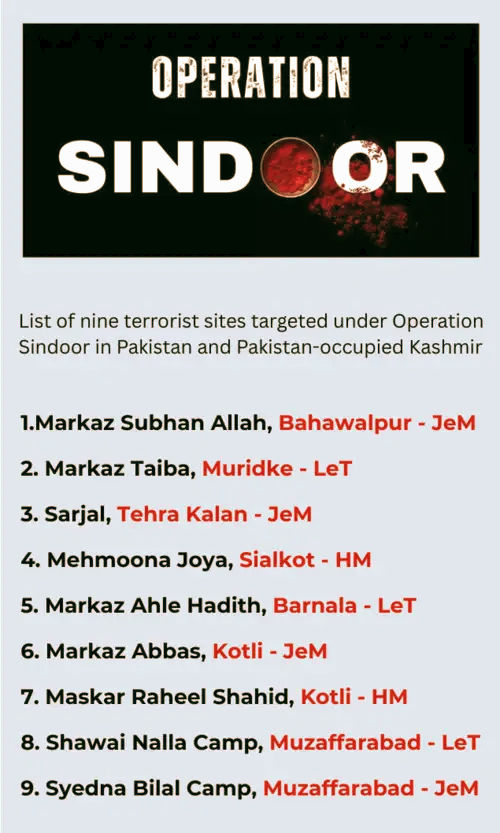🇮🇳💥 Operation Sindoor: India’s Precision Strike on Terror Camps in Pakistan & PoK 🔥🎯
- telishital14

- May 7, 2025
- 3 min read
On May 7, 2025, India launched Operation Sindoor, a meticulously planned and surgically executed military operation targeting terrorist infrastructure deep inside Pakistan and Pakistan-occupied Kashmir (PoK). This bold move was a direct and calibrated response to rising cross-border terrorism and marked a significant escalation in India’s counter-terror doctrine. 💥

🎯 Why Operation Sindoor Was Launched
The immediate trigger was the horrific Pahalgam massacre on April 22, 2025, in which 26 civilians — mostly Hindu tourists — lost their lives in a brutal terror attack. The group responsible, The Resistance Front, is widely believed to be a proxy of Lashkar-e-Taiba (LeT), with operational and logistical support traced back to Pakistan.
In light of clear intelligence inputs and mounting public pressure, India decided to hit back — not with rhetoric, but with precision. Operation Sindoor was conceived to dismantle terror hubs that had operated with impunity under state protection.
⚔️ What Exactly India Did
Operation Sindoor was a joint military operation involving the Indian Air Force, with support from the Army and Navy, carried out in the early hours of May 7. It focused on crippling the core infrastructure used by terror outfits for planning, recruitment, and training.
Key operational highlights:
Time of strike: Early morning, lasting around 23 minutes
Aircraft used: Rafale fighter jets
Weapons deployed: SCALP long-range missiles and AASM Hammer bombs
Execution strategy: All strikes launched from Indian airspace — no territorial breach
Avoided military targets to prevent escalation; only terror facilities were struck
🔍 The operation emphasized restraint with resolve, designed to deliver a message without inviting a broader military conflict.
🧨 Terror Targets Destroyed
India targeted nine high-value terrorist facilities, striking deep inside both Pakistan and PoK. Each location had a long history of harboring or training militants involved in attacks on Indian soil.
📍 In Pakistan:
Markaz Subhan Allah, Bahawalpur – Jaish-e-Mohammed (JeM) HQ
Markaz Taiba, Muridke – Lashkar-e-Taiba (LeT) HQ
Sarjal, Tehra Kalan – JeM training facility
Markaz Ahle Hadith, Barnala – LeT radicalization center
Mehmoona Joya, Sialkot – Hizbul Mujahideen (HM) operational base
📍 In Pakistan-Occupied Kashmir (PoK):
Markaz Abbas, Kotli – JeM base of operations
Maskar Raheel Shahid, Kotli – HM training camp
Shawai Nalla Camp, Muzaffarabad – LeT launchpad
Syedna Bilal Camp, Muzaffarabad – JeM terror coordination center
🎯 These weren’t symbolic strikes. They were aimed at breaking the backbone of the terror machinery.

💬 India's Message to the World
The Indian Ministry of Defence stated:
"Operation Sindoor was a focused, measured, and non-escalatory mission targeting specific terror infrastructure. It was conducted in response to credible threats and in the interest of national security."
India wanted to ensure that:
There is zero tolerance for terrorism
Non-state actors operating with state support will face consequences
The response is strategic, not emotional
🛡️ Pakistan’s Response & Aftermath
Pakistan confirmed the airstrikes but claimed:
Nine civilian deaths and 38 injuries, including some children
That it shot down five Indian jets and destroyed a brigade HQ (claims not verified by India)
In retaliation, Pakistan initiated cross-border shelling across the Line of Control, which resulted in three Indian civilian deaths.
India, however, did not escalate the conflict further, emphasizing that the mission objectives were achieved and the focus remained on terror, not territorial confrontation.
🌍 Global Reaction
The operation caught international attention. Reactions included:
🇺🇳 UN Secretary-General António Guterres urged both nations to exercise maximum restraint, stating that the world "cannot afford an Indo-Pak conflict."
🇺🇸 U.S. President Donald Trump termed the operation “a shame,” and called for peace while acknowledging India’s right to self-defense
🌍 Other global powers viewed the strikes as a legitimate counter-terror action under international norms

🚀A Strategic Shift in Indian Doctrine
Operation Sindoor wasn’t just another strike — it represented a new doctrine in India’s security framework: swift, focused, and politically unambiguous. It showed that:
✅ India will not tolerate state-enabled terrorism✅ Responses will be measured but devastating✅ Terror groups and their backers will face real consequences
💪 With Operation Sindoor, India sent a clear signal — Enough is enough.
🇮🇳 Jai Hind.




Comments